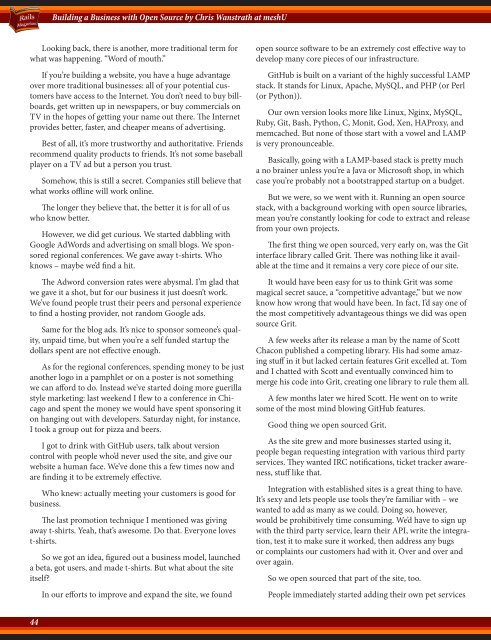Rails Magazine - Issue 3
Rails Magazine - Issue 3
Rails Magazine - Issue 3
You also want an ePaper? Increase the reach of your titles
YUMPU automatically turns print PDFs into web optimized ePapers that Google loves.
44<br />
Building a Business with Open Source by Chris Wanstrath at meshU<br />
44<br />
Looking back, there is another, more traditional term for<br />
what was happening. “Word of mouth.”<br />
If you’re building a website, you have a huge advantage<br />
over more traditional businesses: all of your potential customers<br />
have access to the Internet. You don’t need to buy billboards,<br />
get written up in newspapers, or buy commercials on<br />
TV in the hopes of getting your name out there. The Internet<br />
provides better, faster, and cheaper means of advertising.<br />
Best of all, it’s more trustworthy and authoritative. Friends<br />
recommend quality products to friends. It’s not some baseball<br />
player on a TV ad but a person you trust.<br />
Somehow, this is still a secret. Companies still believe that<br />
what works offline will work online.<br />
The longer they believe that, the better it is for all of us<br />
who know better.<br />
However, we did get curious. We started dabbling with<br />
Google AdWords and advertising on small blogs. We sponsored<br />
regional conferences. We gave away t-shirts. Who<br />
knows – maybe we’d find a hit.<br />
The Adword conversion rates were abysmal. I’m glad that<br />
we gave it a shot, but for our business it just doesn’t work.<br />
We’ve found people trust their peers and personal experience<br />
to find a hosting provider, not random Google ads.<br />
Same for the blog ads. It’s nice to sponsor someone’s quality,<br />
unpaid time, but when you’re a self funded startup the<br />
dollars spent are not effective enough.<br />
As for the regional conferences, spending money to be just<br />
another logo in a pamphlet or on a poster is not something<br />
we can afford to do. Instead we’ve started doing more guerilla<br />
style marketing: last weekend I flew to a conference in Chicago<br />
and spent the money we would have spent sponsoring it<br />
on hanging out with developers. Saturday night, for instance,<br />
I took a group out for pizza and beers.<br />
I got to drink with GitHub users, talk about version<br />
control with people who’d never used the site, and give our<br />
website a human face. We’ve done this a few times now and<br />
are finding it to be extremely effective.<br />
Who knew: actually meeting your customers is good for<br />
business.<br />
The last promotion technique I mentioned was giving<br />
away t-shirts. Yeah, that’s awesome. Do that. Everyone loves<br />
t-shirts.<br />
So we got an idea, figured out a business model, launched<br />
a beta, got users, and made t-shirts. But what about the site<br />
itself?<br />
In our efforts to improve and expand the site, we found<br />
open source software to be an extremely cost effective way to<br />
develop many core pieces of our infrastructure.<br />
GitHub is built on a variant of the highly successful LAMP<br />
stack. It stands for Linux, Apache, MySQL, and PHP (or Perl<br />
(or Python)).<br />
Our own version looks more like Linux, Nginx, MySQL,<br />
Ruby, Git, Bash, Python, C, Monit, God, Xen, HAProxy, and<br />
memcached. But none of those start with a vowel and LAMP<br />
is very pronounceable.<br />
Basically, going with a LAMP-based stack is pretty much<br />
a no brainer unless you’re a Java or Microsoft shop, in which<br />
case you’re probably not a bootstrapped startup on a budget.<br />
But we were, so we went with it. Running an open source<br />
stack, with a background working with open source libraries,<br />
mean you’re constantly looking for code to extract and release<br />
from your own projects.<br />
The first thing we open sourced, very early on, was the Git<br />
interface library called Grit. There was nothing like it available<br />
at the time and it remains a very core piece of our site.<br />
It would have been easy for us to think Grit was some<br />
magical secret sauce, a “competitive advantage,” but we now<br />
know how wrong that would have been. In fact, I’d say one of<br />
the most competitively advantageous things we did was open<br />
source Grit.<br />
A few weeks after its release a man by the name of Scott<br />
Chacon published a competing library. His had some amazing<br />
stuff in it but lacked certain features Grit excelled at. Tom<br />
and I chatted with Scott and eventually convinced him to<br />
merge his code into Grit, creating one library to rule them all.<br />
A few months later we hired Scott. He went on to write<br />
some of the most mind blowing GitHub features.<br />
Good thing we open sourced Grit.<br />
As the site grew and more businesses started using it,<br />
people began requesting integration with various third party<br />
services. They wanted IRC notifications, ticket tracker awareness,<br />
stuff like that.<br />
Integration with established sites is a great thing to have.<br />
It’s sexy and lets people use tools they’re familiar with – we<br />
wanted to add as many as we could. Doing so, however,<br />
would be prohibitively time consuming. We’d have to sign up<br />
with the third party service, learn their API, write the integration,<br />
test it to make sure it worked, then address any bugs<br />
or complaints our customers had with it. Over and over and<br />
over again.<br />
So we open sourced that part of the site, too.<br />
People immediately started adding their own pet services


